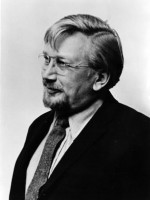Benson, Warren
Biography
Born: January 26, 1924
Died: October 6, 2005
Country: Detroit, Michigan, U.S.A.
Studies: University of Michigan (B.M.1949, M.M. 1951)
Teachers:
Mention: Inducted into the Percussive Arts Society (2003) PAS Hall of Fame[1]
Orchestra: Michigan - The Big List of timpanists
The distinguished composer Warren Benson (1924-2005) is best known for his innovative and expressive music for wind ensemble and his finely wrought song cycles. With such striking works as The Leaves Are Falling (1964), The Solitary Dancer (1966), The Passing Bell (1974) and Symphony II-Lost Songs (1983), Benson created compositions for band and wind ensemble that are masterworks in the repertoire and acclaimed as “among the most important of this century” (United States Marine Band, Bicentennial Collection). His fondness for contemporary poetry led him to write a large body of solo vocal music, much of it for voices with instruments. Benson set to music the poetry of many recognized poets including Tennessee Williams, Kenneth Patchen, May Swenson, Earle Birney, Octavio Paz, and perhaps most memorably, Louise Bogan (Five Lyrics of Louise Bogan [1977], for mezzo soprano and flute), along with Shadow Wind (1968; revised 1992/93), also a masterpiece in its revised version for mezzo-soprano and wind ensemble.
From his early days as a percussionist and timpanist for the Detroit Symphony, Benson was captivated by the variety of sounds percussion instruments can produce and used these in compositions for winds ensemble and a wide variety of music for chamber ensembles. His catalog includes over 150 compositions touching on almost all significant genres of music. His music has been performed in more than 50 countries throughout the world and some 30 works have been recorded.
A graduate of the University of Michigan, Benson received four Fulbright grants, and was the author and director of the first pilot project of the Ford Foundation’s Contemporary Music Project, whose aim was to create new music for schools. He was also honored with a John Simon Guggenheim Composer Fellowship, National Endowment for the Arts composer commissions and the Diploma de Honor from the Republic of Argentina. He held three residencies at the MacDowell Colony, was elected to the National Band Association Academy of Wind and Percussion Arts in 1988, and the Percussive Arts Society Hall of Fame in 2003. Benson was also a founding member of the World Association for Symphonic Bands and Ensembles.
Warren Benson was Professor of Percussion and Composition for fourteen years at Ithaca College, Ithaca, New York. In 1967 he became Professor of Composition at the Eastman School of Music, and was named Kilbourn Distinguished Professor and University Mentor. From 1986-88, he served as Meadows Distinguished Visiting Professor of Composition at Southern Methodist University. He then returned to Eastman where he taught until his retirement as Professor Emeritus in 1993.[2]
Works for Percussion
Canon - Hand Drum with tuba
Concertino for Flute, Strings and Percussion - Multiple Percussion with flute (solo) and strings
How do I Love Thee - Marimba with soprano
Largo Tah - Marimba with bass trombone
Nara - Percussion Duo with soprano; flute; piano
Polyphony for Percussion - Percussion Quartet with wind ensemble
Songs for the End of the World - Marimba; with horn; cello; English horn; mezzo-soprano
Streams (Benson) - Percussion Ensemble
Symphony for Drums - Percussion Sextet with Wind Ensemble
The Red Lion - Vibraphone; with piano
Thorgard's Song - Percussion Ensemble with horn
Three Dances for Solo Snare Drum - Snare Drum
Three Pieces for Percussion Quartet - Percussion Quartet
Trio for Percussion - (Benson) - Percussion Trio
Winter Bittersweet - Percussion Sextet
References
- ↑ PAS.org Accessed March 23, 2013
- ↑ Warren Benson Bio Retrieved 06/04/2012
- Composers
- History
- History-Composers
- History-Performers
- Voice
- Piano
- Trombone
- Flute
- Hand Drum
- Multiple Percussion
- Solo Percussion
- Marimba
- Snare Drum
- Percussion Sextet
- Percussion (6)
- Percussion Septet
- Percussion (7)
- Percussion Duet
- Percussion Duo
- Percussion (2)
- Percussion Trio
- Percussion (3)
- American Composers
- Percussion Ensemble
- Strings
- Wind Ensemble
- Vibraphone
- Tuba
- Percussion Quartet
- Percussion (4)
- Cello
- French Horn
- English Horn
- PAS Hall of Fame
- TheBigList-Timpanist
- Composers of Associated Board of the Royal Schools of Music Percussion Syllabus
